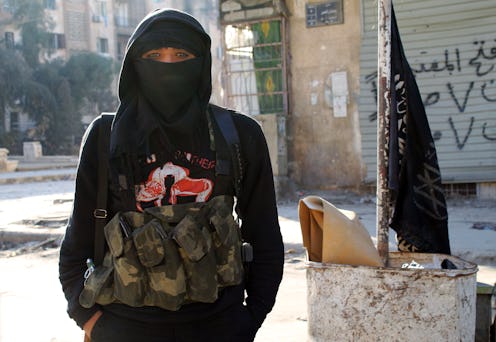News
How Do We Stop ISIS?
On Friday, the militant terrorist group ISIS claimed responsibility for twin suicide bombings which targeted a pair of mosques controlled by Shiite forces in Yemen. The bombings, which have so far claimed the lives of over 120 citizens and injured hundreds more, have been called the "worst mass-casualty attack[s] on civilian life in modern memory," according to Yemeni diplomats, reported Fox News on Friday. While some are doubtful of the group's involvement, with tensions escalating, the question remains: who will stop ISIS and what do global leaders believe we should do next?
According to Middle Eastern officials, the responsibility lies with regional police and intelligence forces. The Daily Beast reported on Thursday that chatter among terror cells in recent months has allowed local law enforcement to predict some movements and stop potential attacks — but their resources still weren't enough to stop the bloody attack by uniformed gunmen on a Tunisian landmark museum on Wednesday, which left 23 dead. President Beji Caid Essebsi explained in a statement that the country faced "exceptional circumstances", but many questioned intelligence officials inability to track the gunmen, despite knowing ahead of time that they would launch an attack. Tunisian lawmaker Sayida Ounissi reportedly told BBC Radio that the government had become aware that the group had been planning to attack the country's parliament; after their initial plans were thwarted, however, the group changed its target, leaving officials in the dark.
In an Aug. 7 meeting last year, French Foreign Minister Laurent Fabius told a U.N. Security Council that his country was "highly concerned about the latest progress of ISIS in the north of Iraq and by the taking of Qaraqosh, the largest Christian city of Iraq, and the horrible acts of violence that are committed", reported CNN. After the tragic attacks on the Charlie Hebdo headquarters in January by militant jihadists, however, speculation over the country's security measures erupted, prompting former NSA head Michael Hayden to call the attack unfortunately "inevitable" and compare it to the Ebola epidemic.
"I don’t know that this was a question or flaw of intelligence sharing, in fact I know that the individuals have shown up on American radars as well as French radars," said Hayden in a statement at the New America Foundation think tank in Washington, D.C. last Tuesday. "When one does the forensics, every one of those inevitable attacks was preventable ... This was far more a question of French resources than it was how exquisite was French intelligence."
Whether the looming threat of ISIS continues its roll due to limited veins of intelligence allocation or simply a shortage in important resources is yet to be determined. But Hayden said he believes that open channels may be the solution, if global communities hope to come together to stop them, calling for nations to "create a deeper degree of trust and transparency and revealing weaknesses" if any real progress is to be made, reported The Guardian on Tuesday last week.
This past August, CNN global affairs columnist Frida Ghitis speculated on possible next steps, indicating that global intelligence might believe that bombing of specific ISIS targets might seem like the most reliable option — but, she said, citizens would fare better with international support instead. Ghitis insisted that regional forces had been outgunned and might be able to resolve the crisis on their own if given the proper equipment and resources. Rather than outside military intervention, terrorized populations would then have the ability to fight back themselves.
With a swath of ISIS attacks on its heels, the world will have to steady itself quickly — until global leaders can resolve their differences and begin information sharing and reprogramming their respective countries' contribution goals, only time will tell when and where the next tragedy will strike.
Images: Getty Images (2)
